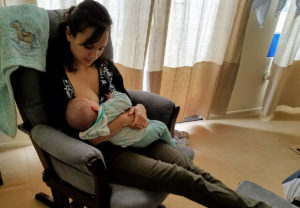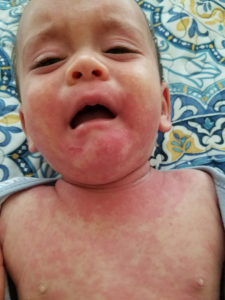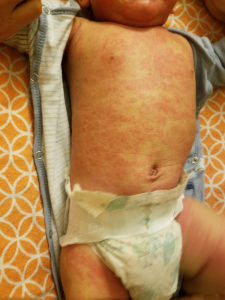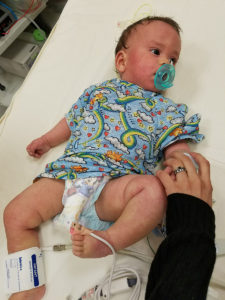Part 2 - Conventional Medicine
Before Lucas was born, I had been on my own health journey. I was raised vegetarian my whole life. Due to severe chronic migraines however, I decided to adopt a strictly plant-based diet when I was 22 years old, 4 years before Lucas was conceived. I educated myself much on diet and health principals and adopted everything I learned. I was a firm believer of combining diet and lifestyle changes with conventional medicine. Therefore, I never doubted vaccinating my child or using medications when advised by a doctor.
I was determined to have a natural birth as long as my body allowed it and to breastfeed Lucas for at least a year. By the grace of God, I was able to do both. I had a completely natural birth and we had absolutely no problem breastfeeding, it came naturally to both of us, Lucas and I. However, because Lucas was born severely underweight, I was immediately pressured to feed him formula. His glucose levels were a bit low and his red blood cell count was off. The doctors urged me to feed Lucas formula to “fix” these issues, but in faith, I refused. I spent the first night and day breastfeeding 24/7, and when they tested his blood again, everything was normal! Praise God! However, the pressure to feed him formula was unceasing from then on.

I believed breast milk was best, especially if he had any health issues or growth problems, as the food that God created for babies had to be the best. I was certainly not going to try a dairy formula, being plant-based myself and having discovered early on that Lucas had allergy problems. However, plant-based formulas were not much better as the idea of giving my baby a formula that was 54% brown rice syrup or corn syrup mortified me! Surprisingly, plant-based infant formulas are very high in unhealthy sugars.
From the time Lucas was 2 months old we began seeing different specialist but it was not until he was 4 months old that we truly began getting desperate to get answers for his allergies, severe eczema, and lack of weight gain. Lucas’ conventional medicine journey included 4 doctors and specialist: the pediatrician, an allergist, a dermatologist, and a gastroenterologist (GI). We started seeing doctors almost every week and I noted how each one treated their own area of specialty rather than seeing the problem as a whole or discover the root cause.
Pediatrician
From the time Lucas was 5 months old, the pressure was on to put weight on him as it became evident that he was not catching up and had a hard time gaining any weight at all. One of the first recommendations was to give him MCT oil. The idea was that he just needed more calories and oil was the easiest way to add calories fast. We were very faithful in giving him the oil, but quickly realized that it was giving him diarrhea. He gained no weight at all. At around 6 months old, a soy formula was suggested in addition to my breast milk. I was skeptical because at this point, I felt the issue was not the amount of milk or calories he drank. However, as Lucas had been exclusively breastfed for 6 months and I was desperate to have him gain weight, we agreed to try the soy formula. Within three days of trying the soy formula, Lucas began throwing up and having diarrhea. Again, no weight gain.
The pediatrician also tested his iron, which showed to be low, so she prescribed an iron supplement, which Lucas also reacted to, causing him to throw up. Another month of no weight gain at all. Before trying these different things, he was at least gaining a little weight! But now we had several weeks of no weight gain.
While we waited for an appointment with the dermatologist, the pediatrician gave us a 2.5% hydrocortisone cream for Lucas’ eczema, which we faithfully applied on all critical areas. At first, the cream seemed to work, but the effect quickly wore off and the eczema came back with full force.
When Lucas was 5 months old, we did regular blood work to test for allergens, about 30 in total. They all came back positive: coconut, nuts, corn, soy, wheat, dogs, cats, dust, etc. They weren’t just positive—on the scale from 1-6, 1 being least allergic and 6 being highly allergic, he appeared to be highly allergic to everything. Curiously, he did not show to be allergic to dairy, eggs, and shellfish, something we attributed to the fact that he had never been exposed to them. His IGE was close to 6000 IU/mL (standard range 0-15 IU/mL), which is an indicator that the body overreacts to allergens. So, we were quickly referred to the Immunologist.
Immunologist/ Allergist
Our first visit with the immunologist was when Lucas was 6 months old. When we received the results that Lucas had so many allergies, I was devastated and filled with anxiety. However, the allergist assured us that the test results didn’t matter because they were hardly ever accurate, and to reintroduce all foods (wheat and soy). I asked her how I would know if he was reacting to the foods I was reintroducing, and she said that I should see hives or throwing up within 2-4 hours of ingesting the food, guaranteed. I remember asking her if there could be a reaction after 24 hours and she said no. Bottom line, she did not want me to restrict my diet because I could become malnourished as a breastfeeding mom.
Wanting to be a good mom and patient, I did just what the doctor said and reintroduced wheat and soy. I was so happy to be eating a regular plant-based diet again! I was even happier when I saw no allergic reaction after 24 hours. We even gave Lucas bread to eat! No vomit, no diarrhea, no hives! I was ecstatic!
 But the happiness didn’t last long. As we later discovered, the steroids were masking the eczema. After 3 days of reintroducing wheat, Lucas was covered in eczema and later began explosively throwing up. I was so confused. I thought we were in the clear, it had been three days! I was heartbroken and desperate.
But the happiness didn’t last long. As we later discovered, the steroids were masking the eczema. After 3 days of reintroducing wheat, Lucas was covered in eczema and later began explosively throwing up. I was so confused. I thought we were in the clear, it had been three days! I was heartbroken and desperate.
The immunologist also prescribed hydroxyzine, an antihistamine, to reduce the itching and for Lucas to sleep better. She said to start with a small dose and keep increasing it until it was effective, up to 10 ml. We did just that. A small dose would work for a few days to help him sleep. When it wasn’t effective anymore, we would have to up the dose until we reached the 10 ml. It never seemed to help his itchiness, but simply made him sleepy. Over time, we started realizing how he was constantly sedated and not himself. Eventually, this medication became completely useless (not that it ever really helped). When we first stopped using the medication, he itched even more than he did before we started the hydroxyzine, scratching desperately all the time. We know it was the medication because after a few weeks off it, his itching went back to his baseline. We tried the medication again sometime after and observed the same thing.
Dermatologist
We finally got to see the dermatologist when Lucas was 7 months old. By this point, he was covered in eczema from head to toe (due to exposing him to so many allergens and the 2.5% hydrocortisone cream not working anymore). The doctor saw Lucas for 5 minutes and immediately prescribed Fluocinolone Acetonide, a steroid-based oil that is suppose to be very safe and effective. We were to cover his body in the oil and use it 4 days on and 3 days off. We were also recommended to try wet wrapping after we applied the steroid (one layer of wet clothes to lock in moisture and one layer of dry clothes). I asked about food allergies and if that could be contributing to his eczema and he assured me that there is no relationship between food and eczema, and that Lucas would grow out of it soon.
When I went to pick up the prescription, the pharmacist warned me to be very careful and use as little as possible as it was a very strong drug. This confused me because the doctor had just assured us it was safe and to just slather his body with it. I trusted my doctor and started applying the oil liberally as instructed. Within 24 hours, Lucas was eczema free! We thought it was a miracle drug and were so excited. But then came the 3 days off the steroid and it took less than a day for Lucas to be covered in eczema again. By the 3rd day, it seemed to be even worse than before. We were happy when it was time to put the steroid oil on his body again expecting the same result. However, this time, it took 2 days for his body to be clear and during the days off the steroid the eczema came back even worse. We went through this for a month, and each time it got worse and worse. It would take longer for the eczema to clear and it would come back with a vengeance when he was off steroids.
 We went back to the dermatologist a month after. This time, we got to see a pediatric dermatologist and we hoped to get some more insight. However, she was both very rude and dismissive of all of our concerns. She told us to try to use the steroid for 2 days on and 2 days off. I shared with her the concern the pharmacist had expressed and wanted to know exactly how much I needed to apply as I was worried it could be too much. I was also beginning to doubt the safety and effectiveness of the steroid oil. The doctor assured me again to simply apply as much oil as was needed for the eczema to clear. I asked what we would do if he didn’t respond to the oil and the answer was to keep trying a stronger steroid until he grew out of it. I wanted to know her input about the connection with diet, and again she dismissed it saying it had no correlation and to not worry, he was going to grow it out. I was treated as an ignorant person. There was no respect for my questions and concerns.
We went back to the dermatologist a month after. This time, we got to see a pediatric dermatologist and we hoped to get some more insight. However, she was both very rude and dismissive of all of our concerns. She told us to try to use the steroid for 2 days on and 2 days off. I shared with her the concern the pharmacist had expressed and wanted to know exactly how much I needed to apply as I was worried it could be too much. I was also beginning to doubt the safety and effectiveness of the steroid oil. The doctor assured me again to simply apply as much oil as was needed for the eczema to clear. I asked what we would do if he didn’t respond to the oil and the answer was to keep trying a stronger steroid until he grew out of it. I wanted to know her input about the connection with diet, and again she dismissed it saying it had no correlation and to not worry, he was going to grow it out. I was treated as an ignorant person. There was no respect for my questions and concerns.
At home, we tried the steroid for 2 days on and 2 days off, but it had absolutely no benefit. Lucas ended up being constantly covered in eczema and the steroids seemed to be having no effect anymore. Even worse, the eczema was more severe than we had ever seen it.
Gastroenterologist (GI)
We were referred to the GI because of the growing concern of Lucas’ lack of weight gain, his vomiting, and diarrhea. We saw the pediatric GI for the first time when Lucas had just turned 8 months old. He was weighing only 13 lb., 5 oz (6kg) and had not gained any weight in 2 months. This doctor was friendly, caring and took her time in addressing all of our concerns. Like the pediatrician, she also thought Lucas’ weight issue was just a calorie problem and that we just needed to increase his food intake. However, because we expressed that Lucas had reacted to the soy formula and was having diarrhea and vomiting, she advised to try Elecare, an infant formula for children with severe allergies. Again, the idea was not to replace my breast milk but to add calories to his diet. Lucas was having up to 25 bowel movements a day, and yet, at no point was his diarrhea addressed. The only thing that mattered was increasing his food intake. There was little concern about the amount of solid foods he ate because they believe that “food is for play” at that age. However, we did notice that he was vomiting more frequently after eating solids, and not with my breast milk.
The doctor ordered some more blood work and told us to come back when we had the results. Meanwhile, we were to keep checking his weight with the pediatrician. Upon reading the ingredients of Elecare, I was horrified. It contained 55% corn syrup! The other ingredients don’t get much better: Safflower oil (9%), MCT oil (8%), soy oil (7%), and then came the amino acids, vitamins and minerals. I did not want to feed my baby this, but we were desperate, and I had to trust the doctor. We tried the formula for 2 days, taking it very slow, just 4 oz at the start. By the third day, Lucas began explosively throwing up and his diarrhea got worse. These symptoms lasted a few days, leading to some more weeks with no weight gain.
We went back to the pediatrician, who was very concerned. That same afternoon she called the Immunologist and GI to consult on what else we could do. Because of his history of allergic reactions and a high eosinophil blood count, they came to the conclusion that, although unlikely at his young age, Lucas might have something called Eosinophilic Esophagitis (EoE), an allergic inflammatory response in the esophagus that can cause vomiting in children. The only way to truly diagnose it was to do an endoscopy and they would also perform a colonoscopy to discard any other issues. They wanted to hospitalize him for 5 days to run some tests and also to put a nasal tube (NG) in to feed more calories while he was there. So to the hospital we went, when Lucas had just turned 9 months old.
 Doctors performed the endoscopy, colonoscopy, and put a nasal tube in him all while he was sedated. I was still to breastfeed and feed him as normal, and at night we would feed him through the nasal tube. They tried a different formula called Neocate, but it had pretty much the same ingredients except for the soy oil. Lucas would normally still wake up every 2 hours to breastfeed, but with the nasal tube, he didn’t want to breastfeed. The formula was not adding calories; it was just replacing my breast milk. On the forth day, Lucas began throwing up explosively; he was reacting to Neocate.
Doctors performed the endoscopy, colonoscopy, and put a nasal tube in him all while he was sedated. I was still to breastfeed and feed him as normal, and at night we would feed him through the nasal tube. They tried a different formula called Neocate, but it had pretty much the same ingredients except for the soy oil. Lucas would normally still wake up every 2 hours to breastfeed, but with the nasal tube, he didn’t want to breastfeed. The formula was not adding calories; it was just replacing my breast milk. On the forth day, Lucas began throwing up explosively; he was reacting to Neocate.
In addition, his eczema got so severe in the hospital that the tape they were using to hold his NG tube and IV, began to cut and destroy his skin. In the end, there was no way to keep the NG tube or IV in place and they took everything out. On the fifth day in the hospital, we got the confirmation that Lucas had Eosinophilic Esophagitis (EoE). The solution: oral steroids for 3 months to reduce the inflammation of the esophagus. We were free to go home.
This made absolutely no sense to me. I had done my research on EoE and learned that the best way to control the disease was with diet, avoiding all allergens. I was willing to restrict his diet and mine in every possible way to help him—why was no one working with me in that sense? Steroids were not a solution, as the doctor herself expressed that the symptoms come back when you stop the steroids. My other concern was that, at this point, Lucas was not throwing up much, at least not enough to account for not gaining any weight in 3 months. His real issue was the diarrhea, not the number of calories he took in either; it was clearly malabsorption. As I expressed these concerns to the GI, the response was to try the steroid and we would see what happened in 3 months. I knew that wasn’t going to solve anything. I saw no hope in sight. This is the moment I realized I needed to start doing my own research and find healing with God’s guidance.

“For I know the plans I have for you,” declares the Lord, “plans to prosper you and not to harm you, plans to give you hope and a future.” Jeremiah 29:11

4 replies on “Part 2 – Conventional Medicine”
Wow. I cannot imagine how he felt and the stress for the parents. A test of faith.
Sad what conventional medicine offers in certain cases, I’ve experienced myself. What a terrible experience. Praise God you went to Him for help!
An amazing story of faith!!!
In disbelief. How heartbreaking & stressful!